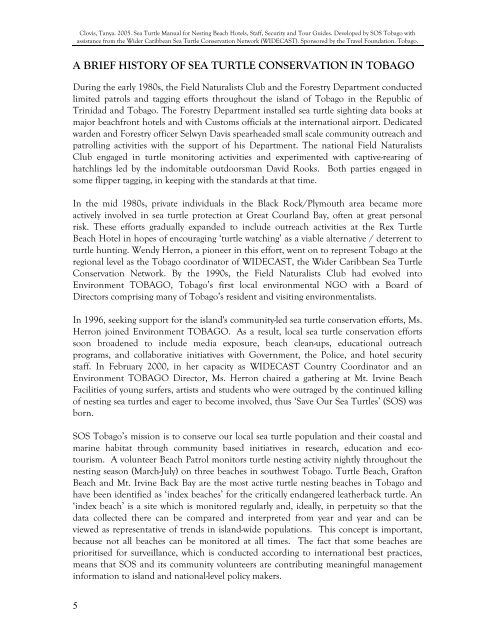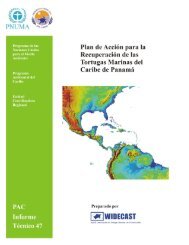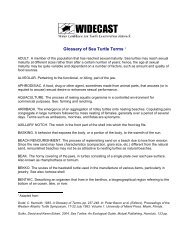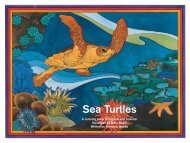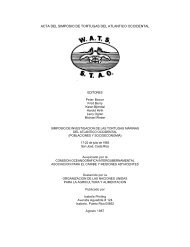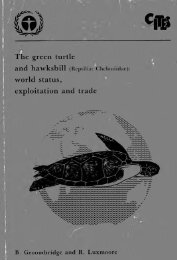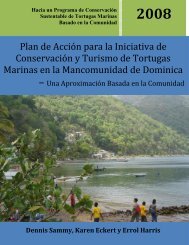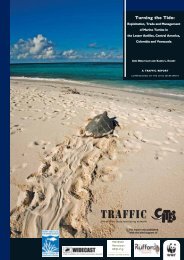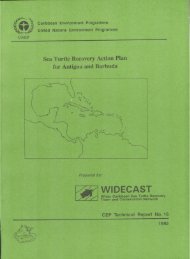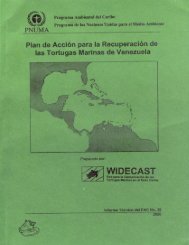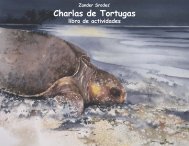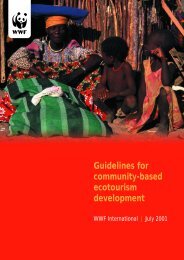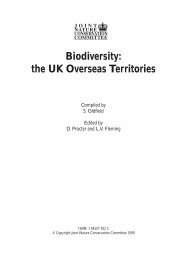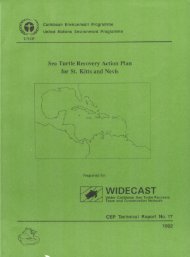Clovis, Tanya. - WIDECAST
Clovis, Tanya. - WIDECAST
Clovis, Tanya. - WIDECAST
You also want an ePaper? Increase the reach of your titles
YUMPU automatically turns print PDFs into web optimized ePapers that Google loves.
<strong>Clovis</strong>, <strong>Tanya</strong>. 2005. Sea Turtle Manual for Nesting Beach Hotels, Staff, Security and Tour Guides. Developed by SOS Tobago with<br />
assistance from the Wider Caribbean Sea Turtle Conservation Network (<strong>WIDECAST</strong>). Sponsored by the Travel Foundation. Tobago.<br />
A BRIEF HISTORY OF SEA TURTLE CONSERVATION IN TOBAGO<br />
During the early 1980s, the Field Naturalists Club and the Forestry Department conducted<br />
limited patrols and tagging efforts throughout the island of Tobago in the Republic of<br />
Trinidad and Tobago. The Forestry Department installed sea turtle sighting data books at<br />
major beachfront hotels and with Customs officials at the international airport. Dedicated<br />
warden and Forestry officer Selwyn Davis spearheaded small scale community outreach and<br />
patrolling activities with the support of his Department. The national Field Naturalists<br />
Club engaged in turtle monitoring activities and experimented with captive-rearing of<br />
hatchlings led by the indomitable outdoorsman David Rooks. Both parties engaged in<br />
some flipper tagging, in keeping with the standards at that time.<br />
In the mid 1980s, private individuals in the Black Rock/Plymouth area became more<br />
actively involved in sea turtle protection at Great Courland Bay, often at great personal<br />
risk. These efforts gradually expanded to include outreach activities at the Rex Turtle<br />
Beach Hotel in hopes of encouraging ‘turtle watching’ as a viable alternative / deterrent to<br />
turtle hunting. Wendy Herron, a pioneer in this effort, went on to represent Tobago at the<br />
regional level as the Tobago coordinator of <strong>WIDECAST</strong>, the Wider Caribbean Sea Turtle<br />
Conservation Network. By the 1990s, the Field Naturalists Club had evolved into<br />
Environment TOBAGO, Tobago’s first local environmental NGO with a Board of<br />
Directors comprising many of Tobago’s resident and visiting environmentalists.<br />
In 1996, seeking support for the island's community-led sea turtle conservation efforts, Ms.<br />
Herron joined Environment TOBAGO. As a result, local sea turtle conservation efforts<br />
soon broadened to include media exposure, beach clean-ups, educational outreach<br />
programs, and collaborative initiatives with Government, the Police, and hotel security<br />
staff. In February 2000, in her capacity as <strong>WIDECAST</strong> Country Coordinator and an<br />
Environment TOBAGO Director, Ms. Herron chaired a gathering at Mt. Irvine Beach<br />
Facilities of young surfers, artists and students who were outraged by the continued killing<br />
of nesting sea turtles and eager to become involved, thus ‘Save Our Sea Turtles’ (SOS) was<br />
born.<br />
SOS Tobago’s mission is to conserve our local sea turtle population and their coastal and<br />
marine habitat through community based initiatives in research, education and ecotourism.<br />
A volunteer Beach Patrol monitors turtle nesting activity nightly throughout the<br />
nesting season (March-July) on three beaches in southwest Tobago. Turtle Beach, Grafton<br />
Beach and Mt. Irvine Back Bay are the most active turtle nesting beaches in Tobago and<br />
have been identified as ‘index beaches’ for the critically endangered leatherback turtle. An<br />
‘index beach’ is a site which is monitored regularly and, ideally, in perpetuity so that the<br />
data collected there can be compared and interpreted from year and year and can be<br />
viewed as representative of trends in island-wide populations. This concept is important,<br />
because not all beaches can be monitored at all times. The fact that some beaches are<br />
prioritised for surveillance, which is conducted according to international best practices,<br />
means that SOS and its community volunteers are contributing meaningful management<br />
information to island and national-level policy makers.<br />
5


